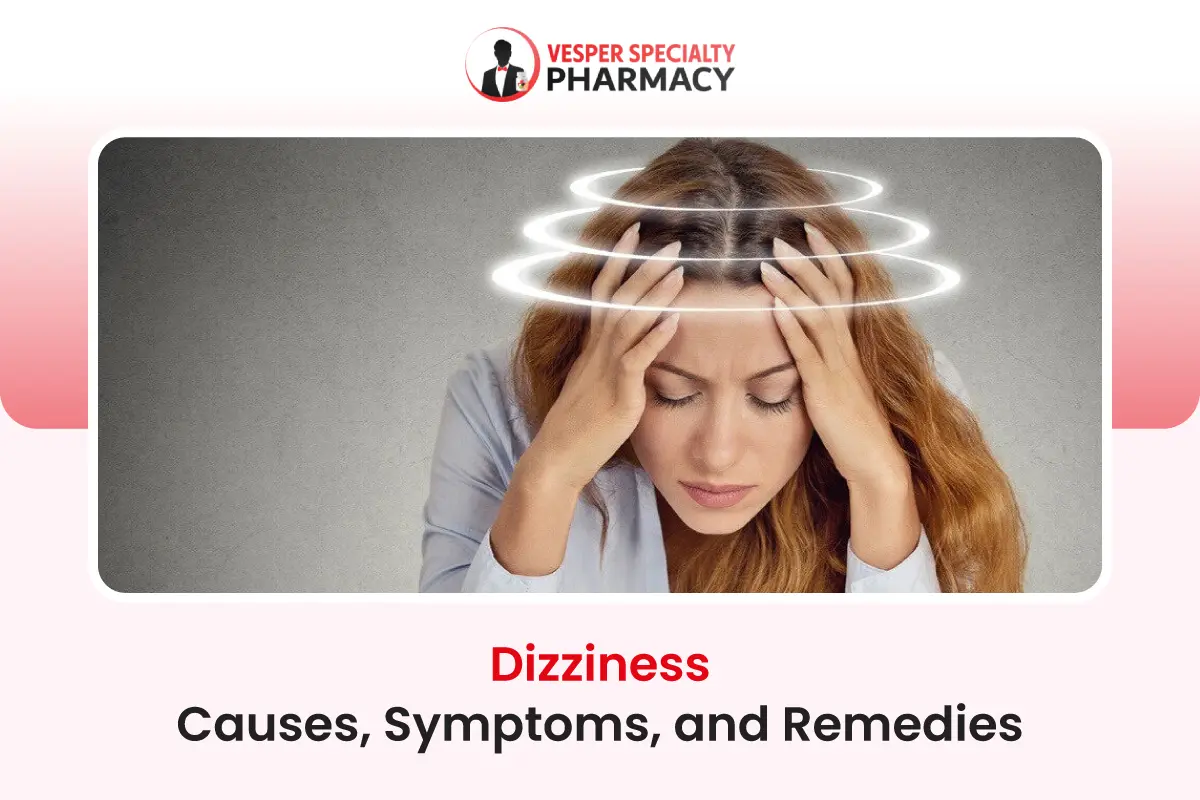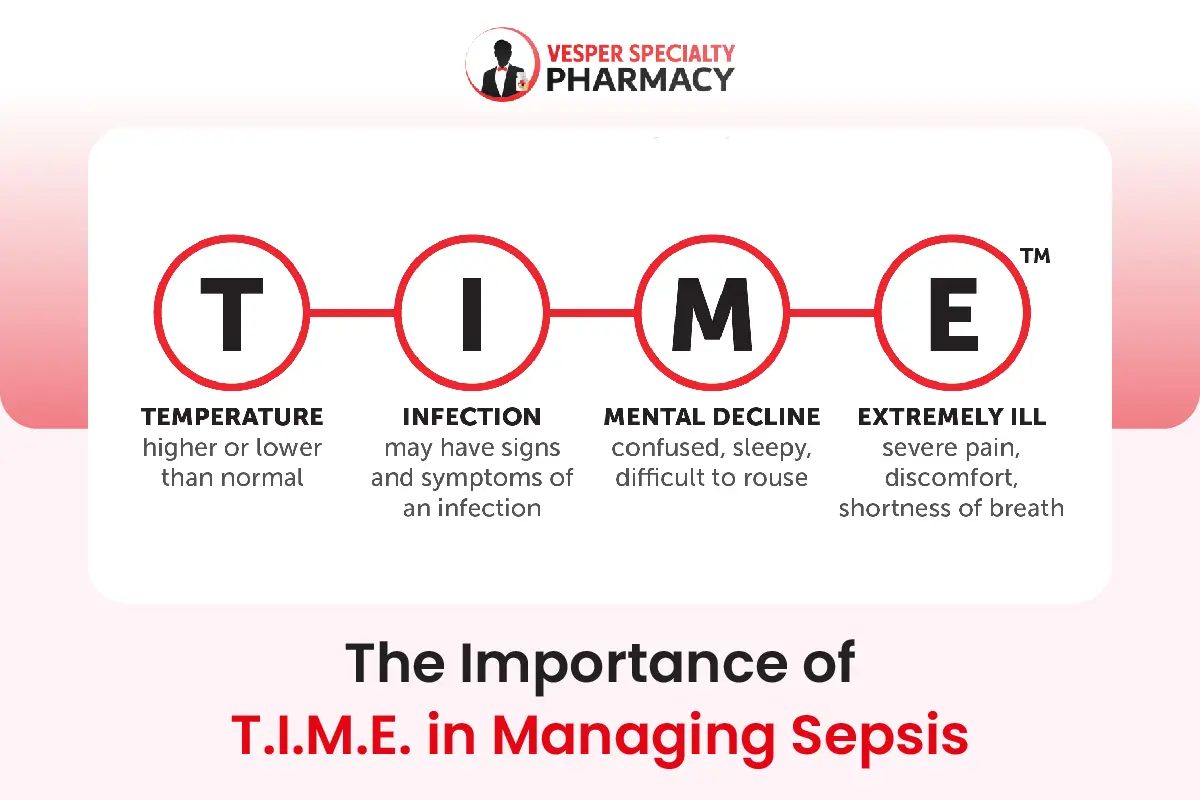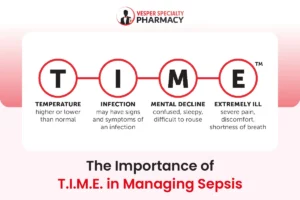Dizziness is a common and often unsettling symptom that can affect individuals of all ages. It can range from a mild sensation of unsteadiness to severe vertigo, making it challenging to maintain balance and carry out everyday activities.
In this comprehensive guide, we will explore dizziness, examining its various types, underlying causes, symptoms, and ways to manage and prevent it.
Table of Contents
What is Dizziness?
Dizziness is a term that encompasses a range of sensations related to a perceived disturbance in balance and spatial orientation. It’s crucial to differentiate between dizziness, vertigo, and lightheadedness, as they describe distinct experiences:
- Dizziness: A general term often used to describe a feeling of unsteadiness or altered spatial perception.
- Vertigo: A specific type of dizziness characterized by the sensation of spinning or the environment spinning around you. It is often associated with disorders of the inner ear or the vestibular system.
- Lightheadedness: A feeling of near-fainting or a sensation that you might pass out. It is typically not associated with a spinning or rotational component.
Dizziness is a symptom rather than a diagnosis, and its underlying cause can vary widely.
Types of Dizziness
Dizziness can manifest in various forms, each with its unique characteristics:
- Vertigo
- Presyncope
- Disequilibrium
- Non-specific Dizziness
Vertigo
Vertigo is perhaps the most distinct and recognizable form of dizziness. People experiencing vertigo often describe it as a spinning or whirling sensation. It can be triggered by changes in head position, such as looking up or turning over in bed. Vertigo is frequently associated with problems in the inner ear, such as benign paroxysmal positional vertigo (BPPV) or Meniere’s disease.
Presyncope (Near-fainting)
Presyncope refers to the sensation of almost fainting, accompanied by lightheadedness and a feeling of impending loss of consciousness. It can result from various causes, including dehydration, low blood sugar, or orthostatic hypotension (a drop in blood pressure when changing positions).
Disequilibrium
Disequilibrium is characterized by a general unsteadiness and a feeling of being off-balance. It can result from issues with sensory input, muscle weakness, or neurological problems.
Non-Specific Dizziness
Non-specific dizziness encompasses sensations that are challenging to categorize precisely. People experiencing non-specific dizziness may use terms like “off,” “woozy,” or “foggy-headed” to describe their symptoms. It can be related to various underlying conditions.
Understanding the type of dizziness you are experiencing can provide valuable clues to its underlying cause, which is essential for effective management and treatment.
What Causes Vertigo and Dizziness?
Dizziness can be attributed to a wide range of underlying factors, and identifying the specific cause is critical for appropriate management. Some common causes of dizziness include:
Inner Ear Problems
The inner ear plays a crucial role in balance and spatial orientation. Conditions affecting the inner ear, such as benign paroxysmal positional vertigo (BPPV), Meniere’s disease, or vestibular neuritis, can lead to vertigo and dizziness.
Vestibular Disorders
The vestibular system, located in the inner ear, helps maintain balance. Disorders of this system, such as labyrinthitis or vestibular schwannoma (a type of tumor), can result in vertigo and disequilibrium.
Low Blood Pressure
A sudden drop in blood pressure, especially when changing positions (orthostatic hypotension), can lead to lightheadedness and near-fainting episodes.
Dehydration
Inadequate fluid intake can lead to dehydration, which can cause lightheadedness and dizziness. It’s essential to stay hydrated, especially in hot weather or during physical activity.
Medications
Some medications, particularly those that affect blood pressure or have a sedating effect, can cause dizziness as a side effect.
Anxiety and Stress
Emotional factors like anxiety and stress can trigger dizziness. The body’s stress response can lead to changes in blood flow and sensory perception, contributing to the sensation of dizziness.
Anemia
Low levels of red blood cells or hemoglobin (anemia) can result in reduced oxygen delivery to the brain, leading to dizziness and fatigue.
Identifying the specific cause of your dizziness often involves a thorough evaluation by a healthcare provider, including a detailed medical history and physical examination. Further diagnostic tests may be necessary to pinpoint the underlying issue.
Dizziness Symptoms and Signs
Dizziness can manifest through a wide range of symptoms and signs, and the experience can vary from person to person. Some common indicators of dizziness include:
Spinning Sensations
In cases of vertigo, individuals often report a spinning sensation. They may feel as though they or their surroundings are rotating or moving when they are not.
Feeling Unsteady
Disequilibrium can result in a persistent feeling of unsteadiness as if one is constantly struggling to maintain balance.
Fainting or Near-Fainting
Presyncope can lead to episodes where individuals feel as though they are about to faint. This sensation is often accompanied by lightheadedness and may involve a brief loss of consciousness.
Nausea and Vomiting
Dizziness, particularly when associated with vertigo, can trigger feelings of nausea and may lead to vomiting.
Sweating
Sweating is a common physiological response to dizziness, especially during episodes of presyncope or intense vertigo.
Visual Disturbances
Dizziness can affect vision, leading to blurred vision, double vision, or difficulty focusing on objects.
Hearing Changes
In some cases, dizziness can be associated with hearing changes, particularly in conditions affecting the inner ear.
These symptoms and signs are essential clues for healthcare providers in diagnosing the underlying cause of dizziness and determining the most appropriate course of treatment.
When to Seek Medical Help?
While occasional, brief episodes of dizziness may not necessarily warrant immediate medical attention, certain situations and symptoms should prompt you to seek medical help promptly. It’s crucial not to ignore the following warning signs:
Severe, Sudden Dizziness
If you experience a sudden and severe onset of dizziness, especially if it is accompanied by other concerning symptoms, such as chest pain or difficulty breathing, seek emergency medical care.
Head Injury Accompanied by Dizziness
If you sustain a head injury and subsequently experience dizziness, it is essential to get medical evaluation, as it may indicate a more severe underlying problem.
Chest Pain or Shortness of Breath with Dizziness
Dizziness, especially when associated with chest pain, shortness of breath, or palpitations, can be a sign of a cardiac or respiratory issue that requires immediate attention.
Sudden Hearing Loss with Dizziness
Sudden hearing loss combined with dizziness may be indicative of an underlying condition that requires prompt medical evaluation.
Dizziness During or After a Head Injury
Dizziness occurring during or after a head injury should never be ignored. It can be a sign of a concussion or more severe brain injury.
In these situations, it’s better to err on the side of caution and seek medical care. Prompt evaluation can help identify any life-threatening conditions and ensure timely treatment.
Diagnosing of Dizziness
Diagnosing the cause of dizziness can be a complex process that often involves a combination of medical history assessment, physical examination, laboratory tests, imaging studies, and specialized vestibular function tests:
Medical History Assessment
Your healthcare provider will begin by taking a detailed medical history, including asking about the specific characteristics of your dizziness, its onset, duration, associated symptoms, and any potential triggers or factors that alleviate or worsen the symptoms.
Physical Examination
A thorough physical examination can help identify signs of underlying conditions, such as abnormalities in blood pressure, heart rate, or neurological function. Examination of the ears and eyes is particularly important.
Laboratory Tests
Blood tests may be ordered to assess various factors, including blood sugar levels, electrolyte imbalances, and markers of infection or inflammation. Anemia, for example, can be detected through blood tests.
Imaging Studies
In some cases, imaging studies such as magnetic resonance imaging (MRI) or computed tomography (CT) scans may be recommended to rule out structural abnormalities in the brain or inner ear.
Vestibular Function Tests
Specialized tests, such as electro nystagmo graphy (ENG) or video nystagmo graphy (VNG), can assess the function of the vestibular system in the inner ear. These tests help diagnose conditions like benign paroxysmal positional vertigo (BPPV) or vestibular neuritis.
The diagnostic process may vary depending on the suspected cause of dizziness and may require the expertise of an otologist or a neurologist. Accurate diagnosis is critical for effective treatment.
Managing and Treating Dizziness
The treatment of dizziness depends on its underlying cause and the specific symptoms experienced. Here are some strategies and treatments commonly used to manage dizziness:
Home Remedies
- Hydration: If dehydration is a contributing factor, increasing fluid intake can help alleviate dizziness.
- Rest: Taking a break and resting in a quiet, comfortable environment can often relieve dizziness.
- Dietary Adjustments: For individuals with low blood sugar or anemia, dietary changes may be recommended.
Vestibular Rehabilitation Therapy (VRT)
VRT is a specialized form of physical therapy designed to improve balance and reduce symptoms in individuals with vestibular disorders. It involves exercises and maneuvers that target the vestibular system.
Medications
- Antiemetics: Medications that control nausea and vomiting may be prescribed for dizziness accompanied by these symptoms.
- Vestibular Suppressants: In cases of vertigo, medications that suppress the vestibular system’s activity may be recommended, although their use is typically limited to short-term relief.
- Medications for Underlying Conditions: Treating the underlying condition responsible for dizziness may involve medication management. For example, individuals with Meniere’s disease may be prescribed diuretics or other medications to manage symptoms.
Lifestyle Changes
- Avoid Triggers: Identifying and avoiding triggers that exacerbate dizziness is essential. This may include minimizing alcohol or caffeine consumption.
- Manage Stress and Anxiety: Techniques for managing stress and anxiety, such as relaxation exercises or counseling, can be beneficial if emotional factors contribute to dizziness.
Effective management of dizziness often requires a personalized approach tailored to the individual’s specific diagnosis and symptoms. It’s important to work closely with a healthcare provider to determine the most appropriate treatment plan.
Preventing Dizziness
While not all causes of dizziness can be prevented, adopting certain lifestyle habits and preventive measures can reduce the risk of experiencing dizziness:
Stay Hydrated
Dehydration is a common cause of dizziness, so ensure you drink an adequate amount of water throughout the day, especially in hot weather or during physical activity.
Manage Stress and Anxiety
Stress and anxiety can exacerbate dizziness. Practicing stress-reduction techniques such as meditation, deep breathing exercises, or yoga can help manage these emotional factors.
Medication Management
If you are taking medications that list dizziness as a side effect, discuss this with your healthcare provider. They may adjust your medication or recommend alternatives.
Avoid Triggers
Identify and minimize exposure to potential triggers of dizziness, such as alcohol, caffeine, or certain foods.
Gradual Position Changes
If you experience orthostatic hypotension (a drop in blood pressure upon standing), make gradual changes in position to minimize the risk of dizziness.
Living with Dizziness
Coping with chronic or recurrent dizziness can be challenging, but there are strategies that can help improve your quality of life:
- Support Systems: Seek support from friends, family, or support groups. Sharing experiences and advice with others who have experienced dizziness can be invaluable.
- Adaptations to Daily Life: Make necessary adaptations to your daily routine to accommodate dizziness. This may include using assistive devices, such as a cane, to improve stability.
- Emotional and Psychological Aspects: Recognize the emotional and psychological impact of dizziness. Counseling or therapy can be beneficial in addressing anxiety or depression that may arise as a result of chronic dizziness.
Living with dizziness often requires patience and adjustment. It’s essential to work closely with healthcare providers to manage the condition effectively and maintain your overall well-being.
Conclusion
In conclusion, dizziness is a complex symptom with various potential causes and manifestations. While it can be unsettling, it is important to remember that dizziness is often treatable and manageable, especially when the underlying cause is identified. Seeking prompt medical evaluation when necessary, following treatment recommendations, and adopting preventive measures can significantly improve one’s quality of life.
If you experience dizziness or have concerns about its causes and management, do not hesitate to consult with a healthcare provider. They can provide guidance, conduct necessary tests, and tailor a treatment plan to address your specific needs.
By understanding the different types of dizziness, recognizing its symptoms, and taking appropriate steps for diagnosis and treatment, individuals can regain their sense of balance and minimize the impact of dizziness on their daily lives.















